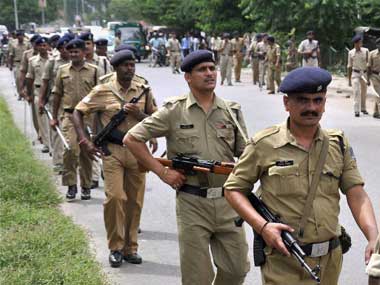In his ongoing series of pep talks for his countrymen, Prime Minister Narendra Modi has rightly picked on the police. He wants them to be SMART - strict and sensitive, modern and mobile, alert and accountable, reliable and responsive, and trained and techno-savvy. Considerable thought would have gone into his new acronym in which he has two meanings for each letter, which certainly addresses most of the responsibilities of the police force. “Today’s police has to be SMART, with each letter of the acronym having a definite and specific meaning. Only then will there be a new and big awakening among the huge police force that we have,” he said speaking at the 49th all India conference of the DGPs and the IGPs in Guwahati. [caption id=“attachment_1829767” align=“alignleft” width=“380” class=" “]  PTI image.[/caption] He went on to lament that some Bollywood films depicted the police in bad light and suggested ways to inspire the police force. He also had a few tips to improve efficiency. It was clear that his intent was to see only the good and ignore the bad. But since the occasion brought the top brass of police from all states, it would have been appropriate if he had balanced it out with some frank conversation because some of the ills that plague law enforcement in the country are deeply anti-people. Even though the occasion might have demanded an appreciative approach, it was also an opportunity for tough talk because without a serious introspection and admission of guilt, the police is never going to get SMART. Let’s look at three, just three among many, critical points. The long pending police reforms It has been eight years since the Supreme Court of India passed some directives aimed at police reforms - mainly to free the police from the control of the state ruling party and to improve its accountability. Fixed tenure for police officers, state security commissions to prevent government interference, transparency in the selection of police heads and the separation of investigation from law and order were among the directives. The Supreme Court also wanted to set up a police complaints authority to examine the charges against police. However, none of the states have implemented the directives. The government of India’s role is limited because policing is a state subject, but the home ministry could exert pressure and keep following up. Instead, what happens is a routine meeting in which police reforms is an item for stock taking. In a recent meeting convened by home minister Rajnath Singh, it was an agenda item yet again. It’s so strange that despite the highest court’s order, the states are in open defiance. In every state, it’s a caged parrot. Accountability for human rights violations Our police is notorious for third degree measures and custodial deaths, perhaps a habit that had been deeply inculcated during the British Raj. According to a 2013 report, 11820 people had died in police custody in five years - either in jail or police stations. More over, 3532 people had committed suicide in custody. The figures came out when the Supreme Court heard a petition asking for the implementation of a series of directions to prevent custodial deaths. The court said: “Despite repeated judgments and directions passed by the Supreme Court in the writ petition D K Basu, which has been pending for last 27 years, laying down guidelines for prevention of custodial violence and deaths, implementation by various states appears to be extremely lax.” The judge also said that the NHRC in 2011-12 registered 94,985 cases of human rights violations across the country. Nearly half of it was from UP, followed by Delhi and Haryana. Here again, the reason is the total disregard of the Supreme Court by the state governments. Does SMART have any meaning when ground reality is this gross? Very poor police-to-people ratio India’s average police to people ratio is 1:761, one of the lowest in the world. The UN recommends one policeman for every 450 people while the home ministry’s own Bureau of Police Research and Development’s standard is one for every 568 people.In comparison, every VIP has at least three policemen to look after him/her. A large portion of our police resources are deployed for VIP security. There is a huge variation in the ratio across the states with Uttar Pradesh, Bihar, Gujarat and West Bengal maintaining the worst record. In these states, one policeman has to manage more than 1000 people. Interestingly, they are also among the states that depute the maximum number of police personnel for VIP duty. And this is the force that Modi wants to become SMART. Probably, he is earnest in his wish, but he cannot be unmindful of the ground realities since he was a chief minister prior to this job. He cannot be unaware of the fact that police is a victim and a beneficiary of the stranglehold of the state governments and that it can be freed and made SMART only by ruling parties in the states. In other words, police personnel cannot become SMART themselves, but have to be set free by politicians. Modi’s call, therefore, should have been addressed to the Indian politicians.
Police cannot become SMART themselves, but have to be set free by politicians. Modi’s call, therefore, should have been addressed to the Indian politicians.
Advertisement
End of Article


)

)
)
)
)
)
)
)
)



